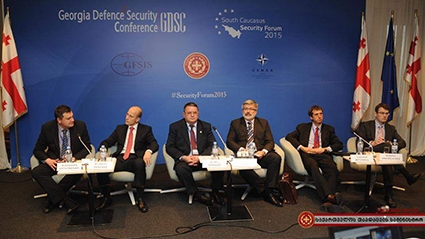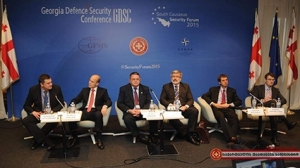3rd South Caucasus Security Forum Held
On 26 October, Tbilisi hosted the South Caucasus Security Forum 2015, organized by the Georgian Foundation for Strategic and International Studies, the Georgian Defense Ministry and Center for European and North Atlantic Affairs.
The event was opened by the Georgian Defense Minister and Prime Minister Irakli Garibashvili involving more than 300 participants from around the globe, including high-ranking experts and ambassadors as well as government representatives.
James Appathurai, Special Representative of the NATO Security General, addressed the gathering: “Georgia has all the necessary instruments to join the NATO Member countries.”
According to Appathurai, Georgia should follow the path to NATO. He stated that the yearly program has already been established and instruments that are beneficial for Georgia have already been created adding: “We need to help Georgia prepare.”
He continued that the Alliance is doing its best to support Georgia, “Including by means of their physical presence in Georgia.”
Some high-caliber security experts and analysts, including Michael Cecire from the Foreign Policy Research Institute, Lincoln Mitchell of Columbia University, as well as Ariel Cohen from the Atlantic Council, were present as panelists.
Most of the experts and government officials, including ones from Moldova, Ukraine and other European countries loudly stated that Georgia deserves NATO membership and the country can meet all the membership criteria of the Alliance. What remains for Georgia on the Euro-Atlantic path is a political decision by the 28 member countries of NATO, which as yet seems far from achievable.
Considering information warfare and threats to Georgia from the Russian side, the panelists stated that the current hybrid warfare in Ukraine is the very continuation of what happened in Georgia in 2008 when Russia waged a 5-day war against the sovereign country on its own territory.
Lincoln Mitchel, who serves as a scholar at the Arnold Saltzman Institute of War and Peace, stated that Russia’s President Putin is not likely to keep the existing status quo in either Georgia or Ukraine. Moreover, as Mitchell believes, the Russia-Georgian war of 2008 was the result of “bad US analysis” and non-strategic approach.
As a summary, the South Caucasus Security Forum 2015 was assessed as highly positive by all parties involved. The format provided a unique opportunity for the international experts and decision-makers to exchange both their scientific and professional perspectives and work on some common approaches in terms of securing peace and stability in the Caucasus and in the wider Black Sea region, as well as in Eastern Europe.
The Faculty of Social Sciences, Charles University Prague and the Czech Republic partnered the Security Forum along with the Antall Jуzsef Knowledge Center of Political and Social Sciences (Hungary) and the Polish Institute of International Affairs (PISM.)
Steven Jones












